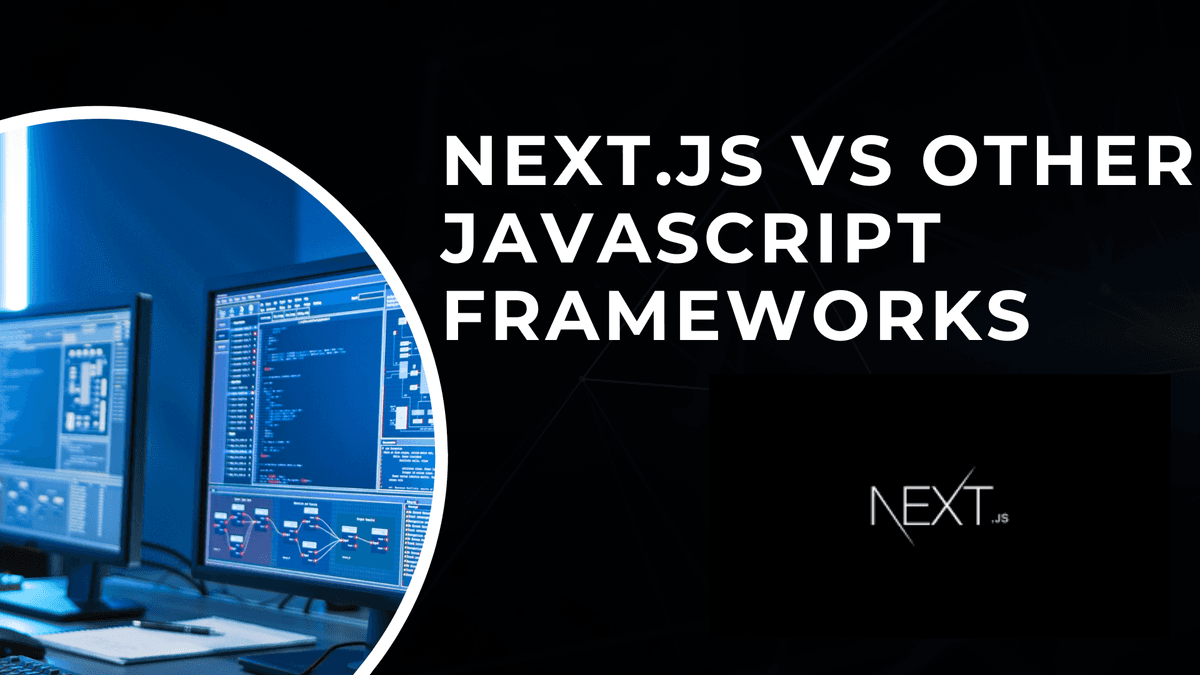

Next.js vs. Other JavaScript Frameworks: Why It’s the Best Choice for Your Next Website
Published: 2024-12-24 09:17:20
In today's fast-paced digital landscape, choosing the right framework for building websites can be a daunting task. With numerous frameworks and technologies to choose from, Next.js stands out as a top contender for web development. At Code With TLS, we believe Next.js offers unmatched performance, scalability, and flexibility, making it an excellent choice for your next website.
What is Next.js Used For?
Next.js is a React-based framework that enables developers to build fast, scalable, and SEO-friendly websites. It is widely used for creating dynamic, server-rendered web applications. The key feature of Next.js is its ability to handle both the front-end and back-end of applications seamlessly, offering both static site generation (SSG) and server-side rendering (SSR). With these capabilities, Next.js empowers developers to create websites that load quickly and perform exceptionally well in search engine rankings.

Is Next.js Better Than React?
Next.js vs React is a common debate in the web development community. While React is an excellent JavaScript library for building user interfaces, Next.js builds on top of React, offering additional features like automatic static optimization, server-side rendering, and API routes for backend functionality. These built-in features make Next.js a powerful choice for developers looking for a more comprehensive solution than React alone.
In simple terms, Next.js enhances React by providing better performance, scalability, and SEO benefits right out of the box.
👉Join Mern Stack Development
Is Next.js Frontend or Backend?
The question of whether Next.js is frontend or backend can be a bit confusing. The truth is, Next.js is a full-stack framework, allowing developers to work on both the front-end and back-end of applications. It uses React for building the user interface (UI) and offers features for creating API routes and handling server-side logic, thus bridging the gap between the front-end and back-end.
Next.js allows you to render pages server-side or statistically at build time, depending on your requirements. Therefore, it can handle both frontend and backend tasks.
What is Next.js Good For?
Next.js is ideal for projects where performance and SEO matter. It's used extensively for building:
- E-commerce websites
- Content management systems (CMS)
- Blogs and personal portfolios
- Marketing landing pages
- News websites
Thanks to its built-in features like static site generation and server-side rendering, Next.js delivers fast, optimized websites with superior user experiences.
Where is Next.js Used?
From e-commerce stores to media websites, Next.js is a versatile framework suitable for various types of web applications. It is commonly used by companies like Netflix, TikTok, Hulu, and Twitch, who rely on its robust performance and scalability.
Can Next.js Replace React?
Next.js cannot replace React; rather, it complements it. React remains the primary UI library, while Next.js serves as a more comprehensive framework that adds performance optimizations and enhances server-side rendering. Next.js vs React is not an either-or decision; instead, think of it as Next.js building on the foundation laid by React to provide additional features.
Is Next.js on Top of React?
Yes, Next.js is built on top of React. It provides a higher level of abstraction that makes it easier to build production-ready React applications by integrating features like server-side rendering and static site generation.
Should I Learn React or Next.js in 2025?
If you are new to web development, start with React. It’s the core library, and understanding it well will help you leverage the full potential of Next.js. Once you’re comfortable with React, learning Next.js will take your web development skills to the next level.
Is Next.js Front-End or Full-Stack?
Next.js is a full-stack framework. It not only helps you build the user interface (front-end) but also offers backend capabilities like server-side rendering and API routes, which can handle your back-end logic. With Next.js, you can build everything from static sites to dynamic, data-driven websites and applications.
Can Next.js Be Used for Frontend Only?
Yes, Next.js can be used for frontend only. Although it is capable of handling backend logic, you can choose to use it as a front-end framework and leverage its static site generation (SSG) or server-side rendering (SSR) features. This makes it a great choice for building fast-loading websites with excellent SEO.
Is Node.js Frontend or Backend?
Node.js is a backend JavaScript runtime environment. It enables JavaScript to be run on the server, making it a powerful choice for building server-side applications and APIs.
Next.js vs. Other JavaScript Frameworks
Let’s compare Next.js with other popular JavaScript frameworks:
- Next.js vs React: As mentioned earlier, Next.js enhances React by offering server-side rendering and static site generation.
- Next.js vs Node.js: Node.js is a runtime environment for building backend applications, while Next.js is a framework that combines both frontend and backend capabilities.
- Next.js vs Express: Express is a backend framework for Node.js, whereas Next.js is a full-stack framework that includes frontend and backend functionalities.
- Next.js vs React Native: While React Native is used for building mobile apps, Next.js is designed for web applications, specifically for building SEO-friendly and fast-loading websites.
- Next.js vs Angular: Angular is a full-fledged front-end framework, whereas Next.js is a full-stack framework with built-in features for server-side rendering and static site generation.
Is Next.js Better Than React JavaScript?
Next.js is better than React in certain scenarios, especially when it comes to performance, SEO, and backend integration. However, React is a better choice when you need a simple, lightweight front-end solution. Next.js takes React a step further by offering more advanced features.
Next.js Documentation and Tutorial
To learn more about Next.js, check out the official Next.js documentation. There are also a number of great Next.js tutorials available to help you get started on your journey. At Code With TLS, we offer tailored courses that dive deeper into Next.js and React development. Explore our courses today!
Courtesy: www.nextjs.org
Conclusion
In conclusion, Next.js stands out as a superior choice for modern web development. It enhances React with features like server-side rendering and static site generation, making it an excellent choice for developers looking to build fast, SEO-friendly websites. Whether you’re a beginner or an experienced developer, learning Next.js is a wise investment for your career in 2025 and beyond.
Interested in learning more? Get in touch with us at info@codewithtls.com or reach us via our contact page. You can also call us at 918527866980 for any inquiries!
Let’s start building your next website with Next.js today!


